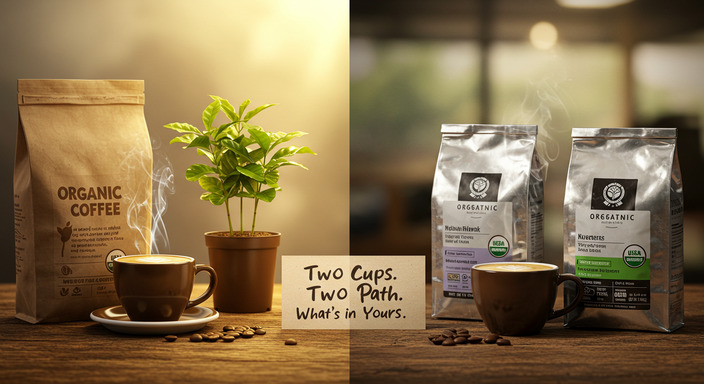
Organic vs. Conventional Coffee: Differences and Benefits Explained

Table of Contents
ToggleCoffee is an essential part of many people’s daily routines, but have you ever considered how your coffee is grown? When choosing between organic and conventional coffee, the differences go beyond just taste. They impact health, the environment, and farming practices.
But is organic coffee really better? And is conventional coffee as bad as some people claim? Let’s explore the key differences, benefits, and potential downsides of both types.
1. What Is Organic Coffee?
Organic coffee is grown without synthetic pesticides, herbicides, or chemical fertilizers. It follows strict regulations set by organizations such as:
✅ USDA Organic (United States)
✅ EU Organic (European Union)
✅ JAS Organic (Japan)
Organic coffee farms rely on natural fertilizers like compost and coffee pulp and use eco-friendly pest control methods such as planting shade trees to attract birds that eat harmful insects.
Key Characteristics of Organic Coffee
- 🌿 Grown without synthetic chemicals (pesticides, herbicides, or fertilizers)
- 🌎 Produced with sustainable farming methods
- ☕ Tends to have a purer, more natural flavor
- 👩🌾 Often supports fair trade and small-scale farmers
2. What Is Conventional Coffee?
Conventional coffee is grown using modern agricultural methods, including synthetic fertilizers and pesticides. It prioritizes high yields and efficiency to meet global demand.
Many large-scale coffee farms use chemical treatments to protect crops from pests, diseases, and weeds, which can help increase production but may also have negative environmental and health effects.
Key Characteristics of Conventional Coffee
- 🚜 Uses chemical fertilizers and pesticides to maximize yields
- 💰 More affordable and widely available
- ⚡ Higher caffeine content in some cases due to faster growth
- 🏭 Mass-produced for commercial markets
3. Comparing Organic vs. Conventional Coffee
| Feature | Organic Coffee 🌿 | Conventional Coffee 🚜 |
|---|---|---|
| Pesticides & Chemicals | No synthetic pesticides or fertilizers | Uses synthetic chemicals for pest control |
| Environmental Impact | Eco-friendly, supports biodiversity | Can cause deforestation and soil degradation |
| Taste & Quality | Natural, complex flavors | Often stronger and more bitter |
| Caffeine Content | Can be slightly lower | Can be slightly higher due to faster growth |
| Health Impact | Free from synthetic chemical residues | May contain traces of pesticides |
| Price | More expensive due to sustainable farming | More affordable, mass-produced |
4. Benefits of Organic Coffee
✅ 1. Fewer Chemical Residues
Since organic coffee is grown without synthetic pesticides, there is less risk of consuming harmful chemicals in your daily cup.
✅ 2. Better for the Environment
Organic farming supports biodiversity by avoiding harmful chemicals that can pollute soil and water. Shade-grown organic coffee also helps preserve forests.
✅ 3. Richer, More Natural Flavor
Many coffee lovers believe that organic coffee has a cleaner, smoother taste because it is grown in healthier soil without artificial chemicals.
✅ 4. Supports Small Farmers
Most organic coffee comes from small, independent farmers who use traditional growing methods rather than large-scale industrial farms.
5. Benefits of Conventional Coffee
✅ 1. More Affordable
Conventional coffee is cheaper because it is produced on a larger scale with high-efficiency farming techniques.
✅ 2. High Availability
Since most of the world’s coffee is conventionally grown, it’s easier to find in supermarkets and cafés compared to organic coffee.
✅ 3. More Caffeine in Some Cases
Because conventional coffee is often grown in direct sunlight and with chemical fertilizers, it can have higher caffeine content than shade-grown organic coffee.
✅ 4. Large-Scale Economic Impact
Conventional coffee production supports millions of jobs worldwide, from farming to processing to global trade.
6. Environmental Impact: Which One Is More Sustainable?
| Factor | Organic Coffee 🌿 | Conventional Coffee 🚜 |
|---|---|---|
| Soil Health | Enriches soil with compost and natural fertilizers | Can deplete soil nutrients with chemical use |
| Deforestation | Often shade-grown, preserving forests | Large farms may clear rainforests for planting |
| Water Pollution | No chemical runoff | Pesticides and fertilizers can pollute water sources |
| Wildlife Impact | Protects biodiversity | Chemical farming can harm ecosystems |
👉 Verdict: Organic coffee is better for the environment, but conventional coffee is more efficient for mass production.
7. Is Organic Coffee Worth the Higher Price?
Organic coffee costs more because it requires more labor-intensive farming and certification costs. But is it worth it?
You should consider organic coffee if:
✅ You prefer natural, chemical-free products
✅ You want to support sustainable and ethical farming
✅ You appreciate complex, high-quality flavors
Conventional coffee is a good choice if:
✅ You want a budget-friendly, widely available option
✅ You need a strong, high-caffeine coffee
✅ You don’t mind industrial farming methods
8. How to Identify High-Quality Coffee
Regardless of whether you choose organic or conventional coffee, look for:
- ☕ 100% Arabica beans (higher quality than Robusta)
- 🌎 Single-origin coffee (for a purer, more authentic flavor)
- 🏆 Freshly roasted beans (avoid pre-ground for better taste)
- ✅ Certifications like USDA Organic, Rainforest Alliance, or Fair Trade
Conclusion: Which Coffee Is Right for You?
The choice between organic and conventional coffee depends on your priorities, budget, and taste preferences.
- If you value purity, sustainability, and ethical farming, go for organic coffee.
- If you prefer affordability, stronger caffeine, and easy availability, conventional coffee is a good choice.
No matter what you choose, the best coffee is the one that tastes best to you. Experiment, explore, and enjoy every sip! ☕✨
Frequently Asked Questions (FAQ)
1. What’s the main difference between organic and conventional coffee?
Organic coffee is grown without synthetic pesticides, herbicides, or chemical fertilizers. Conventional coffee, by contrast, is typically cultivated using chemical inputs to enhance yield and protect crops from pests and diseases.
👉 Learn more about what defines organic coffee
2. Is organic coffee healthier than conventional coffee?
Yes, studies suggest organic coffee may contain higher levels of antioxidants and fewer chemical residues, which could make it a healthier choice for some consumers.
👉 More on organic coffee and health
3. Does organic coffee taste different?
Many coffee enthusiasts describe organic coffee as having a cleaner, richer, and more authentic flavor. However, taste can also vary based on origin, bean variety, and roast level.
4. Is organic coffee non-GMO?
Yes. Certified organic coffee is always non-GMO. Organic certification standards prohibit the use of genetically modified organisms.
👉 Is organic coffee non-GMO?
5. Why is organic coffee more expensive?
Organic coffee typically costs more due to sustainable farming methods, certification processes, and often lower yields. These factors contribute to the higher price but also to better environmental and labor practices.
👉 More from Wikipedia on organic coffee
6. How can I tell if coffee is truly organic?
Look for certifications like USDA Organic or other national organic seals. These indicate that the coffee has met strict organic farming and processing standards.
7. Is organic coffee better for the environment?
Yes. Organic farming promotes biodiversity, soil health, and eco-friendly practices such as shade-grown cultivation, which supports wildlife habitats and reduces deforestation.
👉 Environmental impact details
8. Can I get organic decaf coffee?
Yes, organic decaf options are available. Look for coffee that uses natural decaffeination methods, such as the Swiss Water Process, which avoids the use of harsh chemicals.
9. Does organic coffee have less caffeine?
No. The caffeine content in coffee depends mainly on the bean variety and roast level, not whether it’s organic or conventional.
10. Is switching to organic coffee worth it?
If you value chemical-free farming, sustainability, and potentially richer flavor, switching to organic coffee is likely worth it — for both personal health and environmental impact.
is an editor at Coffee With Finance and a true coffee enthusiast. He explores roasts, flavors, origins, and brewing methods, sharing stories that captivate both beginners and experts. Petter believes great coffee sparks meaningful moments—and that includes simple, jargon-free talks about personal finance. His content blends aroma, flavor, and insight, making each coffee break an inspiring and enriching experience.




























Post Comment